Rupert Murdoch, scrappy Fox mogul who transformed media, begins his Hollywood goodbye
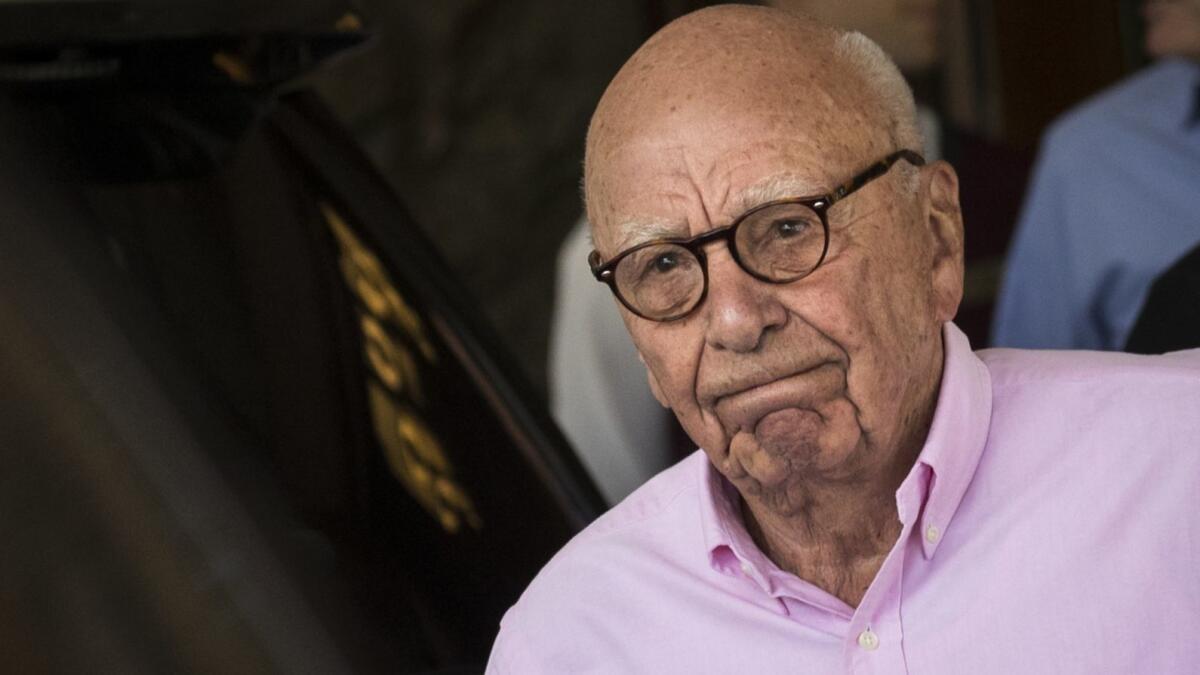
Thirty-four years ago, Rupert Murdoch showed up in Hollywood with $250 million, buying a stake in the 20th Century Fox film studio — even though he had little interest in making movies.
The scrappy Australian newsman, then known for his clamorous tabloids, was viewed with suspicion. Skeptics assumed he was a corporate raider intent on stripping value from the studio. Instead, Murdoch rescued a threadbare operation from financial ruin and turned it into the centerpiece of a growing empire that has reshaped the entertainment industry.
Now, Murdoch is dismantling his life’s work: a kingdom worth more than $100 billion. On Tuesday, his largest company, 21st Century Fox, will be broken apart. Walt Disney Co. will absorb Fox’s legendary movie and television production studios, with their deep trove of titles that includes “Avatar,” “Deadpool,” “Family Guy” and “The Simpsons.” The Murdoch family will create a new entity, simply known as Fox, that will include Fox News Channel, the Fox broadcast network, national Fox Sports channels, TV stations and the 50-acre Fox studio lot in Century City.
The landmark sale seemed unthinkable to many. But the 88-year-old mogul was never enamored of the clubby movie business. He wanted the film studio to support his global push into television, where he has left a more indelible mark. Along the way, he has relished his influence and his image as an outsider, a rascal who took big swings and thumbed his nose at the establishment.
“Rupert has been the most influential person in Hollywood in the last 25 years,” Peter Chernin, Murdoch’s former deputy who now owns his own media company, said in an interview. “He has been the key driver of trends that now define the industry.”
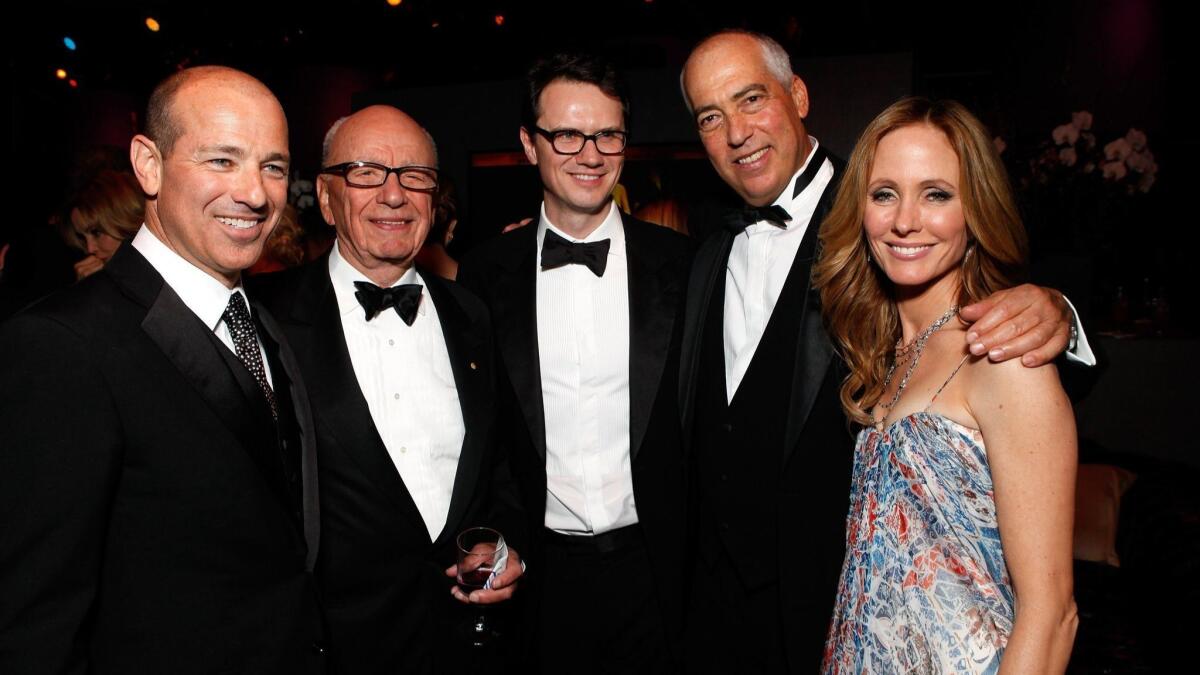
Fox oral history: Inside the legendary studio at the end of its run »
On the Fox Studios lot, Rupert Murdoch is the godfather.
A throwback to an earlier era, he’s the only boss most employees can remember. Murdoch’s original company, News Corp., purchased the historic film studio in 1985, midway through the mogul’s long campaign to buy and launch properties that now span the globe and touch the lives of hundreds of millions of people.
Murdoch in 2013 divided his holdings into two separate companies: News Corp., the publishing unit that includes the New York Post and Wall Street Journal; and 21st Century Fox, the entertainment arm. The Murdoch Family Trust controls both through its ownership of 39% of the companies’ voting shares. Murdoch agreed to the corporate split to appease Wall Street, which agitated for him to sell his newspapers — something he refused to do.
So when word leaked, in late 2017, that Murdoch was planning to unload much of his Hollywood operation, many were stunned. Staff members cried as they struggled to process the news. The heaviness saturated Fox’s annual holiday party that December, which was held on the studio backlot known as New York Street.
Strings of lights stretched between the worn facades, lending a surreal feel to the night.
“It was really reminiscent of the Vito Corleone backstory that takes place in Little Italy,” said John Landgraf, chief executive of FX Networks, referring to the titular character in “The Godfather.”
“I remember just standing there thinking that this has been a place in which films have been made for a long time,” Landgraf said. “And even though Fox will still exist, this Fox isn’t going to exist in the same way.”
Murdoch was not available for comment. Bloomberg News estimates the mogul’s fortune (including family trust holdings) at $19.5 billion, putting him at No. 46 on Bloomberg’s billionaires list.
He is most associated with Fox News, the conservative leaning outlet, which he has helped run since Roger Ailes was forced out in 2016 amid a sexual harassment scandal. But Murdoch also is a towering presence at Fox Studios in Los Angeles.
John Candreva, executive director of Fox’s studio facilities, recalled that Murdoch used to walk four miles from his home, then in Beverly Hills, to the Pico Boulevard lot.
“Who walks to work from Beverly Hills?” Candreva said with a laugh. He recalled a morning when he was at Murdoch’s house, checking his security system.
“He said, ‘Hey, sit down and have breakfast with us,’” Candreva said. “He’s just a phenomenal person, he really is. It was him and the bodyguard … and I am sitting there. And, of course, what did he want to discuss? Politics.”
In liberal-leaning Hollywood, there are plenty of detractors who disagree with Murdoch’s politics and resent Fox News’ influence in American politics.
Last summer, Steve Levitan, co-creator of the hit ABC show “Modern Family” (a Fox production), wrote in a Twitter message that he was “disgusted” to be part of a corporate family with Fox News.
“I do not remotely share Rupert’s politics, but he was an excellent boss of a creative operation because creativity involves risk, and Rupert understood risk,” said Tom Rothman, a former Fox movie chief who now is chairman of Sony Pictures Entertainment’s Motion Picture Group. “And I admire him for that.”
Rothman and other Fox veterans credit Murdoch for encouraging them to take risks. And, they say, his conservative politics didn’t influence programming decisions — unlike at his publications and Fox News.
“Rupert was never a micromanaging boss,” said Chernin, who worked with Murdoch from 1989 to 2009.
His rebellious spirit infused the company’s DNA.
“He was fun, he was wild, and he really wanted to do bold things,” Chernin said. “If you presented him with a plan, Rupert would say, ‘Great, let’s do it.’”
His appreciation for storytelling and controversy was honed as a youth and during his early career when he was a newspaper editor, several people said.
“Fox has always had a pugnacious attitude,” Landgraf said. “And Rupert is not someone who operates out of fear. He really believes in the value of making bets. We are not a box company.”
Matt Groening, creator of “The Simpsons,” said he’s grateful for Murdoch’s support for his show, the longest-running scripted series in prime time. Other networks wouldn’t have touched such an unorthodox cartoon, he said. The mogul even voiced the animated Rupert Murdoch character, introducing himself in one episode as “the billionaire tyrant.”
“He was a good sport. He liked the show, so that was a help,” Groening said. (Disney will own “The Simpsons,” but the show will continue to air on Fox.)
Murdoch shrugged off problems that might have rattled others. When the budget for James Cameron’s epic “Titanic” was ballooning, Murdoch told Chernin: “Don’t let it overwhelm you. Keep your head down and keep going.”
He had strong opinions, and he made them known. At the 2002 Super Bowl in New Orleans, Murdoch was frustrated that Fox network programmers hadn’t ordered a TV show that his daughter in London, Elisabeth, had recommended. “What’s going on with that show?” Murdoch demanded. He ordered his lieutenants to buy the rights and told them not to change the format. It became Fox’s biggest hit, “American Idol.”
FULL COVERAGE: Everything you need to know about the Disney-Fox merger »
Murdoch didn’t hide his disdain for the film business.
“Murdoch was always railing against Hollywood in our weekly meetings with all the heads of the company,” said Bill Mechanic, who ran the Fox movie studio in the mid-1990s. “He’d attack me or the movie business. He said, ‘You guys never take any chances.’ That was crazy, considering the movies I was making.”
Bob Greenblatt, who is now chairman of WarnerMedia Entertainment, worked at Fox in the early 1990s when he was a young TV executive.
“He would come in and talk about what shows he liked, or what shows he didn’t like,” Greenblatt said. One particular show, “Party of Five,” about five siblings trying to make it after their parents were killed by a drunk driver, didn’t escape Murdoch’s critique.
“He would be like, ‘Let’s get rid of it; the ratings are terrible,’” Greenblatt recalled. “But everyone else was so fervent about keeping the show. Rupert never stood in the way of decisions like that. He let us do our jobs.”
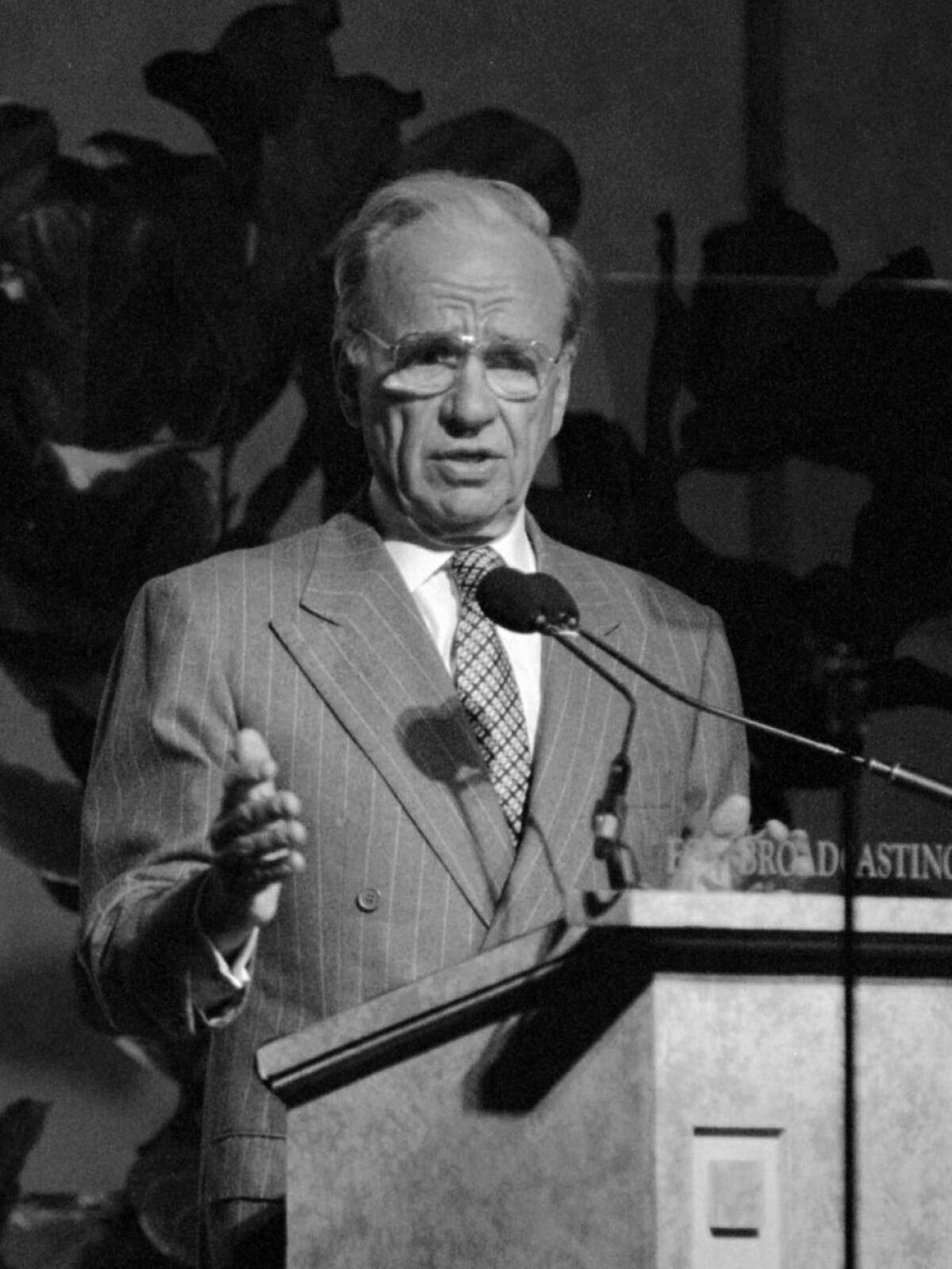
Murdoch’s career began unexpectedly in 1952 upon the death of his father, a respected Australian newspaper editor. Sir Keith Murdoch controlled two newspapers, but one was sold — over Rupert’s objections — to satisfy tax obligations. (Rupert’s mother, Dame Elisabeth Murdoch, was 103 when she died in 2012.)
Murdoch, then 22, returned from Oxford University (where he kept a bust of Lenin in his room to cultivate a rebel image) to run the Adelaide News, earning the nickname “boy publisher.” He would thunder around town in a bulky American car with a Great Dane named Webster.
Soon, he was on a buying spree of newspapers around Australia as well as TV stations. In 1968, Murdoch returned to Britain and bought his first London tabloid, News of the World, and then a second, the Sun. In the ’70s, he had crossed over to America, buying magazines and papers, including the New York Post, Chicago Sun-Times and the Village Voice. A 1977 Time magazine cover portrayed Murdoch as a gorilla stomping across the New York skyline, under the headline: “Extra!!! Aussie Press Lord Terrifies Gotham.”
He used his media outlets to amass enormous political power and was instrumental in breaking the print unions in London in the mid-1980s. Later, he helped launch a satellite TV service, now known as Sky, to challenge the venerable BBC.
He collected friends and enemies in the British Parliament. When his tabloids got caught in a cellphone hacking scandal nearly a decade ago, a committee of Parliament called Murdoch “unfit” to run a news organization.
He would later become an unofficial advisor to President Trump, a devoted Fox News viewer.
Murdoch was the first to build a truly international media conglomerate.
“He was the first person who really understood the power of combining content creation and distribution,” Chernin said. Fox was a major investor in Sky until last fall (when Comcast Corp. won a hard-fought bidding war for the service). His company controlled DirecTV for two years in the early aughts and built the Star India television service into a juggernaut.
Explaining his Hollywood strategy in the 1990 book “Outfoxed: Marvin Davis, Barry Diller, Rupert Murdoch, Joan Rivers, and the Inside Story of America’s Fourth Network” by Alex Ben Block, Murdoch said: “I went [into] entertainment not to get into entertainment. It was part of a broad strategy to get into the media industry — the heart of the media industry.”
For Murdoch, “buying the [Fox] studio wasn’t about rubbing elbows with Hollywood stars. Fox, for him, was always a business deal,” Block said in an interview. “He recognized that compelling content was key to gaining economic and political power.”
In September 1985, Murdoch’s News Corp. bought Denver oilman Marvin Davis’ 50% stake in the studio for $325 million, gaining full control.
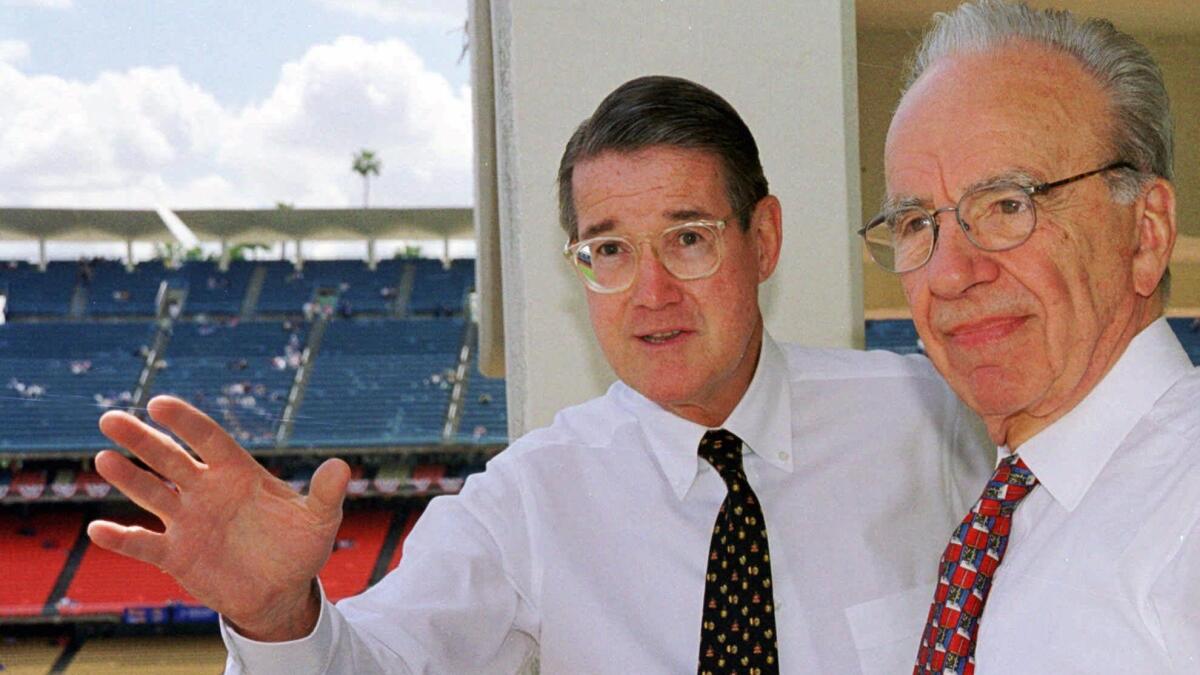
Because he was a foreigner, Murdoch wasn’t allowed to own television stations. That obstacle was expeditiously removed, also in September 1985, when he became a U.S. citizen in a federal courthouse in Manhattan with 185 other immigrants.
His company quickly snapped up an independent TV station group and scurried to launch the fourth network, Fox Broadcasting Co.
“When the Fox network first went on the air, a lot of people didn’t even get the station. People would put tin foil on their antenna, and move it around to try to get a picture,” said Ed O’Neill, who starred as Al Bundy in “Married … With Children,” one of Fox’s original hits. “When I’d go back to visit my family [in Ohio], no one knew I had a television show. They saw me in a couple beer commercials — that’s what made me famous.”
Fox didn’t become a force in television until it lured an NFL football package away from CBS in 1993 in an eye-popping $1.6 billion, four-year deal. Then came the edgy FX cable channel, the launch of Fox News and the purchase of the Los Angeles Dodgers baseball team, which Murdoch used to launch regional sports networks before selling the team in 2004.
The company bought the social network Myspace in 2005 for $580 million, which famously crashed. Murdoch unloaded it six years later for just $35 million. In 2007, Murdoch claimed the Wall Street Journal through the $5-billion acquisition of Dow Jones & Co. Within two years, Murdoch’s company took a write-down of nearly $3 billion on that investment.
Fox also teamed with NBC to launch the streaming service Hulu, which Disney will soon control.
“To say he’s a driven man is an understatement,” Rothman, the former studio chief, said. “The thing he would say to me the morning after a big hit was, ‘What’s next?’”
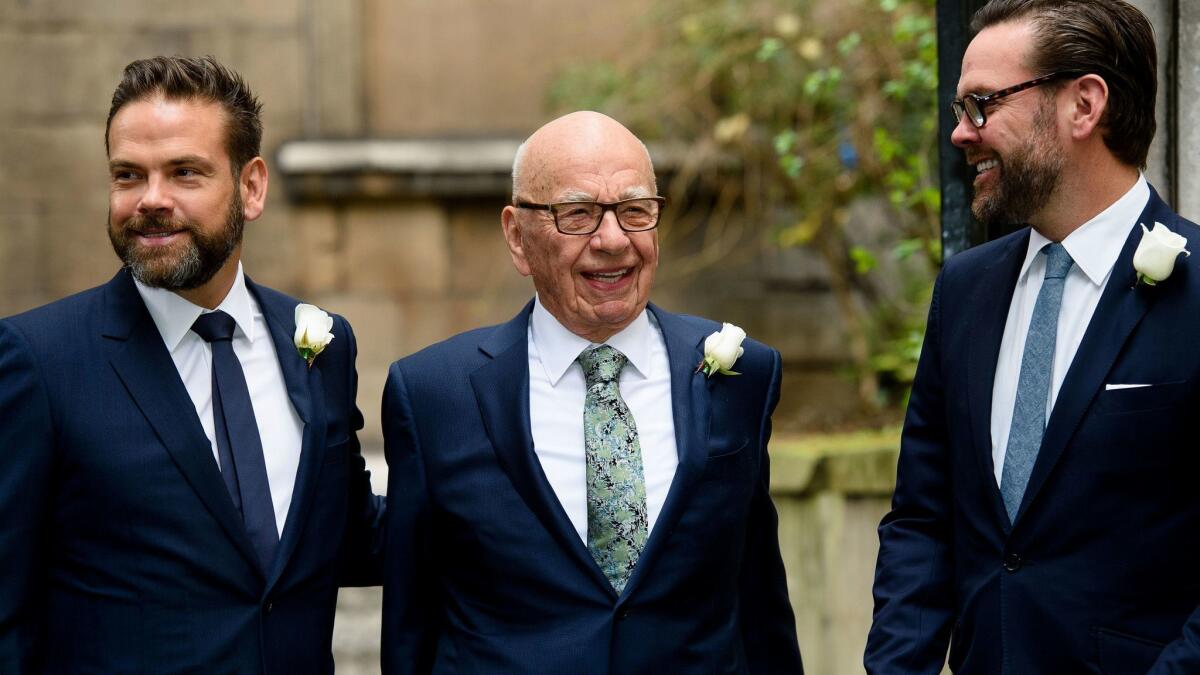
Rupert Murdoch, and sons, begin their goodbyes to 21st Century Fox »
With the future in mind, Murdoch concluded nearly two years ago that his company would be too small to effectively compete with rising tech giants such as Netflix, Amazon and Apple. The Murdoch family will become among Disney’s largest shareholders, giving it an interest in yet another major entertainment company.
The asset sale to Disney also helps alleviate a thorny issue of succession. Murdoch’s two sons no longer will have to share management of the enterprise. Instead, his oldest son, Lachlan, will oversee the slimmed-down Fox as its chairman and chief executive. And his younger son, James, plans to strike out on his own after two decades of working for his father.
A few weeks after the sale was announced, Murdoch fell on his son Lachlan’s yacht in the Caribbean, where the family was vacationing. He suffered a nasty back injury and was bedridden for several weeks at his Moraga Vineyards estate, which hugs the hills above Bel-Air. There he was accompanied by his wife, former model Jerry Hall, who has four children with Mick Jagger.
Hall, whom he married in 2016, is his fourth wife. His previous marriages produced six children: Prudence (with wife Patricia Booker); Elisabeth, Lachlan and James (with second wife, Anna Murdoch Mann); and Grace and Chloe (with third wife, Wendi Deng).
From Moraga Vineyards, he still will be able to overlook his corporate dominion. It just will be a lot smaller.
“We’ve disrupted things in our time,” he told Sky News in December 2017. “You can’t complain.”
Times staff writers Ryan Faughnder and Stacy Perman contributed to this report.
Twitter: @MegJamesLAT
More to Read
Inside the business of entertainment
The Wide Shot brings you news, analysis and insights on everything from streaming wars to production — and what it all means for the future.
You may occasionally receive promotional content from the Los Angeles Times.











